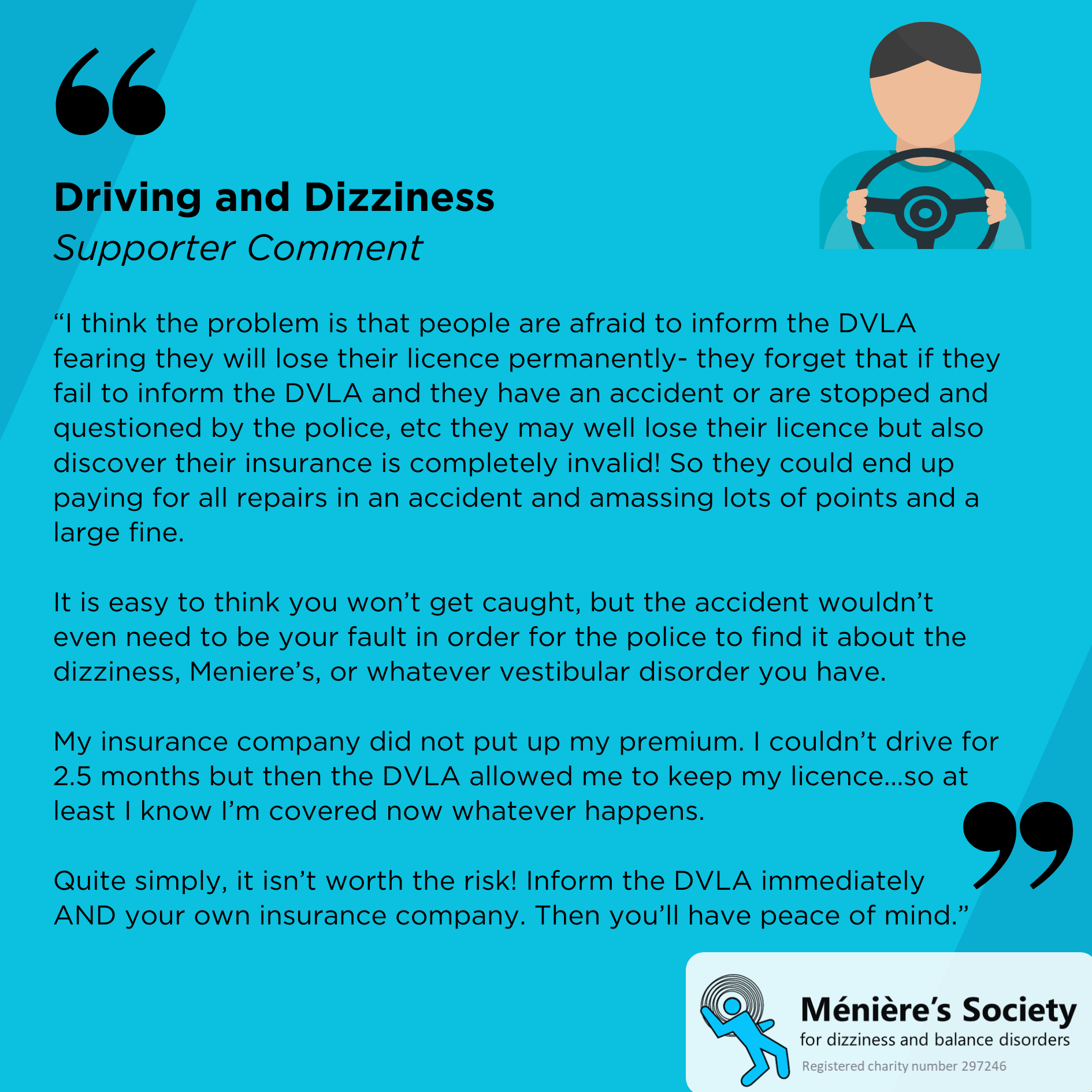There are legal obligations which apply to those who suffer from, or develop, sudden attacks of unprovoked or unprecipitated disabling giddiness, such as Ménière’s or labyrinthine disorder and wish to continue driving.
You are required by law to inform the Driver and Vehicle Licensing Agency (DVLA), as well as the company which insures any vehicle you drive of your condition.
Visit the GOV.UK website for information on Vertigo and Driving (external website).
Providing your condition does not give rise to ‘sudden and disabling attacks of vertigo’ and you comply with the law by notifying the DVLA and your insurer, then only limited changes are likely to occur to affect your driving.
If you already hold a driving licence you should complete the DVLA form “Medical Fitness to Drive”. You will be required to give the DVLA permission for their medical advisor to obtain reports on your condition from your doctor/specialist. The form is available online at: www.gov.uk/dizziness-and-driving. Completed forms should be sent to Drivers Medical Group, DVLA, Swansea SA99 1DF. Visit the GOV.UK website (external link) for other ways to contact the DVLA: https://www.gov.uk/contact-the-dvla/y/driving-and-medical-issues.
Will my driving licence be affected?
Once the DVLA receives your completed form they will assess your situation. You may be able to retain your existing licence or it may be replaced with a new one. They may decide to replace your licence with one valid for a restricted period of between one and three years. After this time your medical ability to continue driving will be subject to further review. A restricted period licence entitles you to drive the same vehicles as your previous ’lifetime’ licence. The only difference between the two licences is the renewal date, although drivers with entitlement to drive Large Goods Vehicles and Passenger Carrying Vehicles are subject to stricter rules. Licences may be revoked or refused by the DVLA if you are not able to meet the medical standards of fitness to drive. The Ménière’s Society has received assurance from the Department of Transport that all cases will be treated individually.
Insurance
Your insurance company should be made aware of your condition as this may affect your premium. Since December 1996, under the provisions of the Disability Discrimination Act, insurance companies are no longer allowed to refuse cover or impose exceptional premiums unless they can produce actuarial evidence that the condition in question carries a demonstrably greater risk. If your insurance company wishes to increase your premium because of your vertigo it is worth obtaining alternative quotes. Ensure they are aware of your condition and that the DVLA have agreed you can continue to hold your licence.
In an accident
If you do not inform the DVLA and your insurance company of your condition and you are subsequently involved in an accident you risk facing two charges;
- You are obliged by law to inform them of your condition. It is an offence not to do so.
- If you have not informed them of your medical condition and you are involved in an accident, there is likely to be a presumption of fault on your part. You will then face the difficulty of proving that you didn’t have a vertigo attack or were not under the influence of drugs prior to the accident.
It is also likely in these circumstances that your insurance company would declare your insurance invalid on the grounds that they were unaware of your illness. Virtually all policies contain a clause requiring you to inform your insurers of any relevant medical conditions or impairments which might affect their risk. You would then be held personally responsible for all claims arising from the accident, including third parties’ as well as your own costs.
Drugs and medication
Section 5 of the Road Traffic Act states it is an offence to drive whilst under the influence of drugs. This may apply to some of the drugs prescribed in the treatment of vertigo, with the notable exception of Serc (Betahistine). Check with your own doctor whether any medication you are taking falls into the prohibited category.
Find out more about the Drug Drive Legislation which came into force 2 March 2015.
In summary
- You are required by law to inform the DVLA and the company which insures any vehicle you drive of your condition. It is an offence not to do so in either case.
- Medical conditions are considered before the granting of a restricted period licence and all cases will be assessed individually by the DVLA.
- It is an offence to drive whilst under the influence of drugs.
- Visit the GOV.UK website for further information: https://www.gov.uk/driving-medical-conditions (external link).
Download this information as a pdf
Case studies
Read some personal stories from supporters about driving and Meniere's:
DVLA and Driving - Notifying the DVLA

